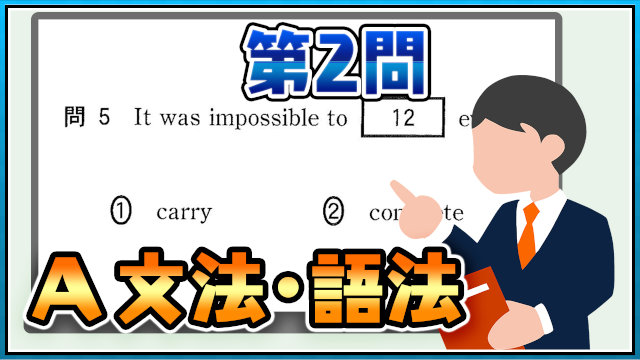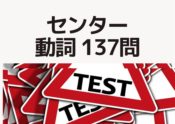2014年度 センター英語追試 第2問A 文法・語法 問題&解説

大手予備校で中1から高3の基礎クラスから東大クラスまでほとんどのクラスを担当しました。映像授業にも多数出演経験あり。
元東海大非常勤講師。
「大学入試英語解く得!」は最高PV数 34,212 / 日
質・量ともに日本一分かりやすい大学入試英語対策ページを目指します!
資格:英検一級、通訳案内士(英語)、TOEIC950点
趣味:海外旅行、食べ歩き
特技:将棋アマ六段 (全国レーティング選手権優勝 1998)
元技術翻訳者、元富士通
2014年のセンター英語追試は、熟語表現が少し難しいかもしれません。
1. 2014年度 センター英語追試 第2問A 文法・語法 問題
次の問い(問1~10)に入れるのに最も適当なものをそれぞれ①~④のうちから一つずつ選べ。ただし、問8~10については、( A )と( B )に入れるのに最も適当な組み合わせを選べ。
1. Robert can’t leave the meeting now because an important plan ( ) discussed.
①had been ②is ③is being ④was
2. Bill, please keep the window ( ) while the air conditioner is on.
①close ②closed ③closing ④to close
3. Last week I bought an imported car, ( ) was something I had always wanted to do.
①it ②that ③what ④which
4. Would you mind doing the laundry while I ( ) the baby?
①care about ②care of ③take care about ④take care of
5. Our teacher’s voice doesn’t ( ) the back of the classroom.
①arrive to ②get ③reach ④sound to
6. On the train, a man ( ) over so that other passengers could go out of the door.
①looked ②moved ③turned ④went
7. I’d like to ( ) your parents a visit sometime next week if they’re going to be at home.
①do ②get ③pay ④take
8. If I ( A ) you were here before I left home, I ( B ) your book with me.
①A:didn’t know / B:have brought ②A:had known / B:would have brought
③A:hadn’t known / B:would bring ④A:knew / B:had brought
9. I need a bigger refrigerator, but I’ll have to ( A ) without a new one ( B ) I can afford it.
①A:do / B:until ②A:do / B:when ③A:keep / B:until ④A:keep / B:when
10. In advertising, it’s hard to come up ( A ) clever ( B ) to attract consumers.
①A:on / B:propaganda ②A:on / B:slogans ③A:with/B:propaganda ④A:with / B:slogans
2. 2014年度 センター英語追試 第2問A 文法・語法 解説
1. Robert can’t leave the meeting now because an important plan ( ) discussed.
①had been ②is ③is being ④was
・物が主語なので、受身を選択。
・時間はnowなので現在。
・be being Vp.p. の形は現在進行形の受身の形。
ロバートは重要な計画が検討されているところなので、今は会議を離れることができません。
2. Bill, please keep the window ( ) while the air conditioner is on.
①close ②closed ③closing ④to close
・keep O C 「OをCのままにしておく」
・窓と閉めるの間に「窓が閉められる」関係があるのでclosedを選択。
ビル、エアコンが付いている間は窓を閉めておいてください。
3. Last week I bought an imported car, ( ) was something I had always wanted to do.
①it ②that ③what ④which
・関係代名詞の非制限用法。主語の欠けた文なので主格のwhichを選択する。
,which = , and that
先週ある輸入車を買ったが、それはずっと欲しかったものだ。
4. Would you mind doing the laundry while I ( ) the baby?
①care about ②care of ③take care about ④take care of
・take care of ~「~の世話をする」
・care about 「~を気にする」
私が赤ちゃんの世話をしている間、洗濯をしてくれますか。
5. Our teacher’s voice doesn’t ( ) the back of the classroom.
①arrive to ②get ③reach ④sound to
・the backと名詞が続くので他動詞reachを選択。
・arrive だったらat、getならtoが必要。reach = arrive at = get to
私達の先生の声は教室の後ろまで届かない。
6. On the train, a man ( ) over so that other passengers could go out of the door.
①looked ②moved ③turned ④went
・move over 「場所を空ける、脇へどく」
列車の中で、ある男性が他の乗客がドアから出られるように脇へどいた。
move over はmove「移動する」とそこまで意味が変わりませんが、熟語問題ではあまり見かけないので選びにくかったかもしれません。
 しげT
しげT
7. I’d like to ( ) your parents a visit sometime next week if they’re going to be at home.
①do ②get ③pay ④take
・pay 人 a visit (=pay a visit to 人) 「人を訪問する」
来週のいつか、あなたのご両親が家にいるようしたらお訪ねしたいです。
8. If I ( A ) you were here before I left home, I ( B ) your book with me.
①A:didn’t know / B:have brought ②A:had known / B:would have brought
③A:hadn’t known / B:would bring ④A:knew / B:had brought
・If ~ before I left home の部分に注目。「家を出る前に~だったら」とあるので過去の話。仮定法過去完了を選ぶ。
・「知っていたら持ってきていただろう」と考えるのが自然だから②を選択。
もしあなたがここにいることを家を出る前に知っていたら、あなたの本を持ってきたでしょう。
9. I need a bigger refrigerator, but I’ll have to ( A ) without a new one ( B ) I can afford it.
①A:do / B:until ②A:do / B:when ③A:keep/B:until ④A:keep / B:when
・do without ~「~なしで済ます」
・買う余裕ができる「まで」は新しい冷蔵庫なしで済ますと考えてuntilを選択する。
私はもっと大きな冷蔵庫が必要ですが、買う余裕ができるまでは新しい冷蔵庫なしでやっていかなければならない。
10. In advertising, it’s hard to come up ( A ) clever ( B ) to attract consumers.
①A:on / B:propaganda ②A:on / B:slogans ③A:with / B:propaganda ④A:with / B:slogans
・come up with ~「~を思いつく」
・slogan「標語、宣伝文句」
・propaganda (組織的、政治的な)「宣伝活動」
広告では、消費者を引き付ける巧みな宣伝文句を思いつくのが難しい。
大手予備校で中1から高3の基礎クラスから東大クラスまでほとんどのクラスを担当しました。映像授業にも多数出演経験あり。
元東海大非常勤講師。
「大学入試英語解く得!」は最高PV数 34,212 / 日
質・量ともに日本一分かりやすい大学入試英語対策ページを目指します!
資格:英検一級、通訳案内士(英語)、TOEIC950点
趣味:海外旅行、食べ歩き
特技:将棋アマ六段 (全国レーティング選手権優勝 1998)
元技術翻訳者、元富士通





